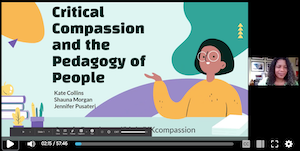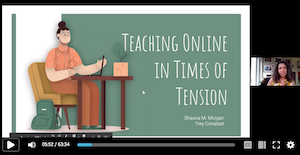The Center for the Enhancement of Learning and Teaching (CELT) is committed to centering discussions on diversity, equity, and inclusion as a critical component of UK’s teaching mission. This work recognizes that higher education historically has excluded students and reified structural racism, sexism, ableism, classism, xenophobia, and other forms of prejudice. It recognizes that countering these historical forces requires that we move beyond the rhetoric of goodwill and enact structural changes, be they material, organizational, pedagogical, or otherwise. It recognizes that change for the benefit of some students in fact benefits all, and moves our students towards creating a more understanding, kind, and just world. It recognizes the troubled history of institutions such as ours as a charge to lead by example in addressing persisting divisions and inequities with an open hospitality. Inclusive and equitable teaching cannot be reduced to a list of best practices, but rather is a mindset of sustained inquiry and reflection regarding one’s own and positionality as well as the positionalities of all students. It invites us to see the intellectual project of teaching and learning in our disciplines with fresh eyes, rejuvenating our experience as teacher-scholars.

Diversity, Equity, & Inclusion in teaching and learning
Workshops and Events
Since 2015, CELT has hosted workshops and events to collaborate with instructors on ways of fostering community and belonging, diversifying the curriculum, practicing inclusive pedagogies, and engaging challenging moments or controversies in the classroom. The workshops below represent current, recent, or new offerings, and can be adapted to particular contexts or needs. They also can serve as starting points for individual consultations. We're eager to work with particular groups, and we often do! If you'd like to request a session, series, or other event, send us a message!
Inclusion & Equity Series
Fostering Community & Belonging
Studies across the disciplines indicate a positive correlation between a shared sense of community and student success. In this workshop, we consider what it means to be in community with others in an academic setting, and we explore the benefits of fostering a sense of belonging through classroom community building and intentional pedagogical choices. Attendees develop insights and develop practical tools for establishing a welcoming classroom environment for all students.
Designing & Facilitating Inclusive Learning Environments
Building on previous discussions about fostering community and belonging in the learning environment, this workshop explores inclusion as a pedagogical practice and invites participants to explore tools and approaches for facilitating an inclusive and equitable classroom.
Controversy in the Classroom
The diversity of students’ experiences and identities inevitably invite topics of public debate to enter our learning environments, and they often become a large part of class discussions whether we welcome them or not. While these moments can create tension in the classroom, ignoring or declining to engage them does not assuage the conflict and stress that continue to shape our students’ education and lived experiences. This workshop considers the generative possibility of engaging tense topics and will explore strategies to effectively facilitate classroom conversations.
Beyond Inclusion Series
Enhancing Equity in Learning Spaces
This event invites participants to explore the concept of integration and to define what that means at the University of Kentucky. As we are prompted to think beyond inclusion towards creating systemic equity in the classroom, residence hall, office, or even more broadly within programs and organizations, participants leave the discussion having identified an opportunity to enhance equity in their area of work and/or with a concrete idea for implementing some action.
Pedagogy, Imagination, & the Promise of Equity
If we were to take as evidence the proliferation of initiatives, offices, programs, events, celebrations, and other mechanisms of promoting diversity in higher education, we seem to have arrived at a moment when, by and large, we all would agree to a basic thesis—diversity matters in higher education, and we have a responsibility to teach in a way that invites all learners to succeed in our classes. Yet, how can we work toward this ambitious goal? On what unrealized structures and social contracts will we base our bold visions for equity? This session will build from participants’ experiences to explore inclusion and equity as both mindset and practice, inquiry and technique, with the aim of sparking the imagination for new ways of transforming the learning environments in participants’ local contexts.
A Mindful Practice of Equitable Pedagogy
An opportunity for self-reflection and deep introspection, this workshop is targeted at teachers who employ inclusive pedagogies and desire further growth in that work. In this workshop will we explore mindfulness as a daily practice towards a sustained work in equitable pedagogical practices.
Decolonizing the Classroom Series
Diversifying Syllabi and Curricula: A View Towards Decolonizing the Discipline
For this workshop we acknowledge that we must challenge extant paradigms at the structural, collective, and individual levels as we explore the rewards of building diverse and inclusive courses. Participants explore theoretical and practical approaches to enhancing syllabi and course materials with an eye towards diversity and decolonization, including a guided analysis of instructors' syllabi and course materials with the goal of identifying areas for further consideration or transformation.
Digressing from the Canon and Engaging the Margins
Building on the tools explored and developed in the first workshop, we delve further into decolonizing the methodologies of our research and teaching. Participants are challenged to reflect on their pedagogy and scholarship and examine how their courses and materials construct, support, or defy knowledge. By the end of the session, participants formulate an action plan for implementing broader representation of material and, ultimately, knowledge in courses.
Decentering Power in Knowledge Production
For the third session in this series, we explore ways of sustaining a classroom climate that challenges students’ expectations about knowledge production and acquisition. Workshop participants are asked to consider the ways in which pedagogical practices buttress or and/or complement more inclusive course material.
Teaching in Times of Tension & Crisis
Thoughtful Pedagogy in a Time of Crisis
This workshop begins with an acknowledgement that in moments of community or individual crisis, students’ learning and general sense of stability can be severely interrupted. With a view towards exploring both practical responses and sustained awareness, we explore potential challenges and possible pedagogical approaches to address the many issues that arise in times of crisis.
Cultivate Critical Thought: Teaching in Tense Times
Recognizing that the issues shaping our world and personal spheres inevitably make their way into classroom spaces whether we invite them or not, this conversation explores the myriad ways instructors can equip themselves to engage students, particularly in times of tension and upheaval. In this workshop we consider how fostering understanding can be a pedagogical tool that creates a classroom community where empathy and critical analysis are not oppositional intellectual pursuits but can, in fact, lead to meaningful and generative conversations.
Remote & Online Learning Series
Engage Students & Create Class Community
Remote and online classes can be challenging for those new to distance learning, but it can also give us the opportunity to create an engaging learning space with a rich community experience. This session explores how to promote student engagement in the online space, as well as how to create an inclusive community of learners that enhances students' sense of potential and belonging.
Equity & Inclusion Online
Celebrated for making academic programs more accessible to students who, for a host of reasons, might not be able to matriculate in a traditional residential learning environment, online spaces can also paradoxically challenge our attempts to develop an inclusive and equitable educational setting. In this workshop, we examine the potential roadblocks to creating an equitable classroom in remote and online courses, as well as possible solutions and pedagogical approaches.
Online Teaching in Times of Tension
This workshop explores the pedagogical challenges of teaching during times when the local, national, or global climate is rife with tensions that affect the socio-cultural or political climates of our communities. Using case studies, we examine potential scenarios in the online classroom setting: a space where some students may feel more emboldened to share their views while others may feel intimidated and retreat to silence. We will discuss and practice strategies to interrupt and address moments of classroom upheaval with an awareness of how students are potentially affected within and outside of the classroom.
Media and Resources
Critical Compassion & The Pedagogy of People
What does trauma look like? How might it affect the learning environment and the people within? This case-study based workshop will consider the ways that stressors shape learning and explore ways that we can practice a pedagogy of compassion. View the session here!
Further Reading and Resources
Diversifying the Curriculum & Learning Activities
We invite instructors across the disciplines to consider ways in which their curricula and learning activities can explore a wide range of human experience—especially that which historically has been elided—and allow students to encounter, process, and express knowledge in a variety of ways. Click on the image or here for the full PDF infographic, which contains generative questions for self-reflection. If you'd like to pursue any of these questions further, CELT is eager to help. Just send us a message!
Teaching Online in Times of Tension
The virtual classroom environment offers its own challenges to belonging and inclusion, particularly when instructors are fostering a climate where students can openly discuss and debate potentially heated topics. This workshop will engage participants in a dialogue about pedagogical approaches to foster inclusion in an online environment with a specific focus on practices that allow a space for challenging conversations. View the session here!
Teaching International Students
Time Differences
Even for students completing coursework remotely within the United States, time zone differences can present a challenge. For students overseas, the difference becomes dramatic. A student in China, for example, is either 12 or 13 hours ahead of Eastern Standard Time, depending on daylight savings. Time zone differences may affect students’ learning in the following ways.
- Class meeting times. If classes meet synchronously, students in other time zones will need to adjust to meet at a different time, which may or may not present other challenges. More dramatic time differences may push class meetings into the evening, nighttime, or early morning hours for international students, when they might have other responsibilities or not be able to participate fully. For equitable learning experiences, consider what a student might need if they were not able to attend a synchronous meeting. And, following that, how might they demonstrate engagement and participation beyond being present?
- Quiz and exam times. If students’ time zones differ significantly from EST, quizzes and exams may not be accessible because the opening and closing times are not flexible enough. A two-hour quiz window, for example, would do little good for a student who must take that quiz between 10:00 pm and midnight. Canvas allows instructors to specify custom opening and closing times for specific students, as well as add more time for individual students.
- Access to peers and the instructor. Students in different time zones may need to speak with their instructor outside of normal office hours, perhaps earlier or later in the day, and they may have communication patterns that are out of alignment with an instructor’s typical availability for a quick turnaround (e.g., via email). In addition, if coursework involves collaboration with peers—synchronous or asynchronous—a more deliberate approach may be needed to ensure that students in different time zones are able to participate equitably.
- Access to Instructional Material. Posting lectures and other instructional materials on Canvas can offset some difficulties related to different time zones. If a student cannot make a live class meeting, or must attend in less than ideal circumstances, their ability to review it on their own time is crucial. Note that UK’s Yuja video hosting platform auto-captions all video content, and these auto-captions can be manually corrected for 100% accuracy.
Engagement
In virtual learning environments, Zoom and other video conference platforms allow us to continue meeting with classes synchronously to establish that critical rapport, community, and interaction that facilitate learning and student success. While videoconference might present some challenges, especially for those of us who have mostly taught in physical classroom spaces, there are ways to engage students in synchronous class meetings. The following are some unique considerations for the design and management of virtual learning spaces that benefit all students, and benefit international students especially.
- Community and belonging. The first way to engage all students, and especially those who may not feel as much of a belonging, is to create a welcoming learning environment that affirms students’ diverse backgrounds and values their experiences and contributions to the class. Kevin Gannon has argued that welcoming continues throughout a semester as opposed to being a one-and-done gesture during the first class meeting. How might activities invite students to bring their perspectives and experiences into the discussion? How might the curriculum foreground diversity in its selection of topics, content, methods, and ways of expressing knowledge?
- Expectations for class discussions. Students whose first language is not English and/or are new to the cultural conventions of conversations in English may feel uncomfortable speaking out loud, breaking the silence, or interjecting themselves into a conversation. All students, but especially these students, benefit from clear structure and procedure for class discussion, e.g., providing specific goals or objectives as well as a time frame, asking students to use the hand-raise button and to say their name before speaking, and circulating questions and prompts beforehand for students to review (or, students may submit these themselves for more of a participatory design).
- Alternative channels for engagement. Speaking on videoconference can be awkward, and, at its worst, impractical once the class size increases. Participation in this sense is limited to whoever can get a word in, which may be prohibitive for international students. To increase the participation in class meetings, and provide alternate modes for thinking and communicating, use the chat feature or a separate live-drafting location (e.g., a Google Doc with class notes and comments). For tips on how to manage these spaces, see our advice essay here. See also our July 2020 Week of Teaching webinars on virtual discussions and engaging students with the Google suite.
- Cultural conventions. Some students may be reluctant to speak during class, to take a stance on an issue, or even to approach an instructor over email or office hours. It’s important not to read this reticence as a lack of motivation or engagement. Rather, an instructor may reach out in a friendly way to students who do not seem to be participating to initiate a conversation about how they’re doing in the class.
Image credit: detail of Jacob Lawrence's Migration Series panel 7, photo by Steven Zucker, CC-BY-NC-SA.



